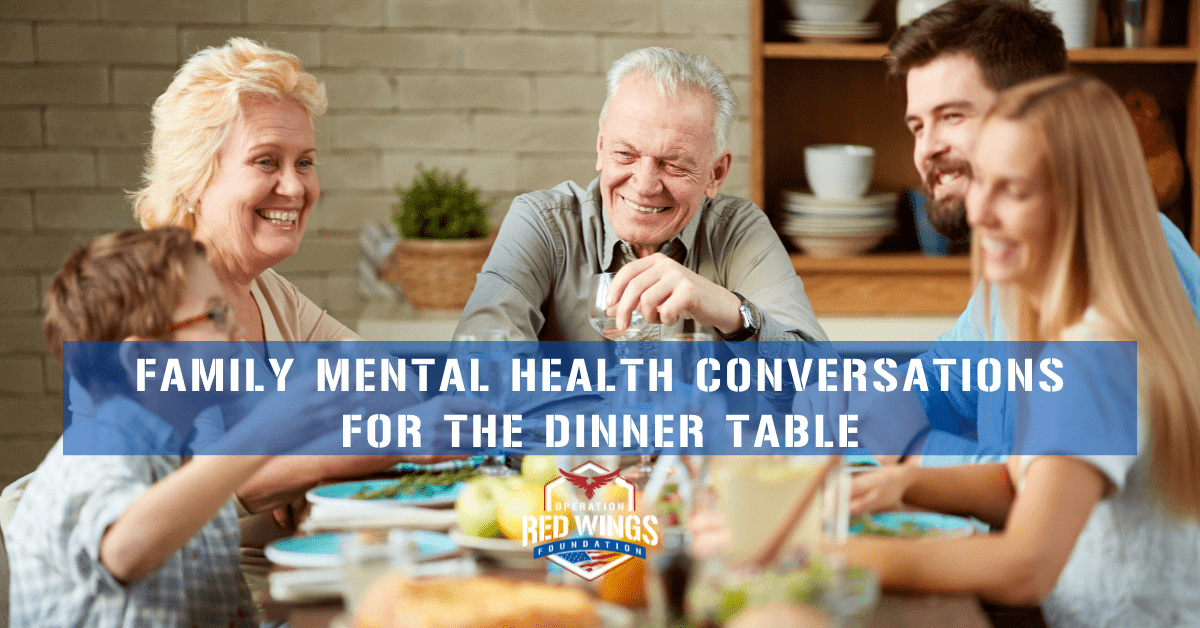Mental health. It can be something that is fragile and also very difficult to talk about. This can be especially true with Veterans, considering the mental health stigma that is out there.
Just remember that you are not alone. Nearly 53 million people in the United States are dealing with a mental illness.
If you or a loved one are part of those 53 million people, you need to find ways to address it. If you are worried about a loved one, you need to find ways to openly communicate about family mental health.
One of the ways that you can do that is at the dinner table.
How will the dinner table help start mental health conversations? How does the dinner table help with mental health?
This is your family and mental health guide.
Open Communication
What the family dinner table does is give you a platform for open communication between you and your family. This can be with your spouse, your children, your older parents, and more.
A family dinner provides you an opportunity where you know that at least once a day, you will sit down and talk as a family.
This can be a chance for everyone to know each other better and get a better idea of what is going on in their lives. Parents can ask kids about how their days at school went, parents can talk about things that are going on at work, and older kids can talk about problems rising such as a new job they may have taken on.
The dinner table creates an open dialogue for a family to communicate about their lives, including their problems. Establishing this line of communication can help other family members feel more comfortable about bringing mental health issues up.
Encouraging a Healthier Lifestyle
You may not realize this while you are doing it, but having family dinners together can encourage a healthier lifestyle for your kids.
If families have dinner together at least three times per week, then children are less likely to be overweight.
On top of this, kids are also likely to eat healthier food, do better academically in school, and have better relationships with their parents. Most of all, kids are less likely to engage in certain activities such as drinking alcohol, taking drugs, and getting involved in sexual activity.
These are all things that can lead children in the right direction and make them less likely to suffer from depression or other mental health issues in the first place.
For example, when it comes to substance abuse, 30% of people who abuse substances are likely to have clinical depression. That has a huge effect on mental health and frankly, can lead to much bigger problems down the road.
You need to minimize the risk of activities that lead to mental health issues in the first place. Eating dinner together as a family on a regular basis is a good start.
Be Empathetic
If you or a loved one want to address mental health issues at the dinner table, one of the best conversational traits to encourage is empathy. This is you actively listening to another person and not just waiting for them to finish speaking.
You need to imagine what it is like to walk a mile in their shoes to understand what they are going through. The same can be said if you wish to address something and want people to try to understand what you are going through.
Establishing that open line of communication early can help encourage empathetic traits. Having empathy will increase the chances that your message goes through and the feeling that you are being heard.
Know that building empathy with younger members of your family can take time. Empathy is a trait that grows with cognitive development, so you have to openly encourage it from a young age to allow that trait to grow.
If you do so successfully, you can see some positive results. Studies have shown that if people experience empathy, they are more likely to feel satisfied and accept compliance to the advice that you give them from there.
Practice empathy to encourage more communication and more satisfaction.
Support Boundaries
Remember, when talking about a sensitive subject like mental health, a person may feel hesitant to share everything that is on their mind. You may feel the same way if you are the one that wants to share your feelings.
In this situation, it is ok to start small and share a little bit of what you are feeling and go from there. If it is another family member trying to share, try not to push too hard for them to reveal more.
Most people need to take this step slowly and grow comfortable with it. To do this, they may set boundaries to take a step in rather than a leap.
For example, people may say that they only want people to listen to what they have to say rather than seek out advice for their problems. If that is the case, try not to push too hard and accept this.
Encourage Family Mental Health Communication
Positive family mental health is a foundation for a family. It is crucial that a family feels like they can openly communicate with each other and trust each other when it comes to discussing their issues such as mental health.
Do you need a platform that can help you with this cause? Register for one of our retreats at Operation Red Wings Foundation today.
Most people need to take this step slowly and grow comfortable with it. To do this, they may set boundaries to take a step in rather than a leap.
For example, people may say that they only want people to listen to what they have to say rather than seek out advice for their problems. If that is the case, try not to push too hard and accept this.
Encourage Family Mental Health Communication
Positive family mental health is a foundation for a family. It is crucial that a family feels like they can openly communicate with each other and trust each other when it comes to discussing their issues such as mental health.
Do you need a platform that can help you with this cause? Register for one of our retreats at Operation Red Wings Foundation today.






